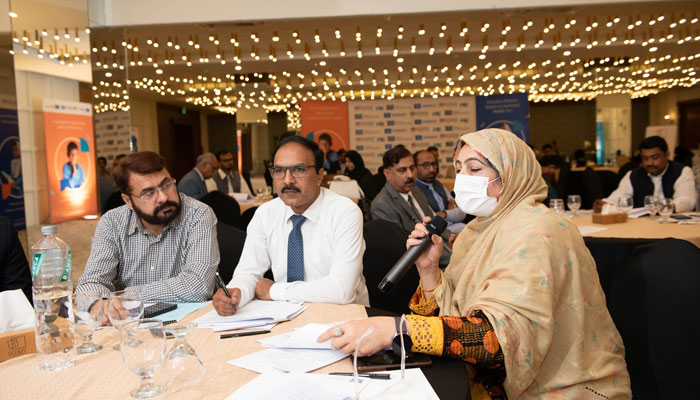Unesco leads dialogue on empowering district education managers in Pakistan
Islamabad:United Nations Educational, Scientific and Cultural Organisation (Unesco), in partnership with the Pakistan Institute of Education (PIE), Unesco International Institute for Educational Planning (IIEP) and the Institute of Social and Policy Sciences (I-SAPS), successfully concluded a three-day national consultative workshop in Islamabad from 15 to 17 April 2025 to validate key research findings on the role of district education managers in Pakistan.
The event aimed to validate key research ndings on the role of district education managers in Pakistan. Supported by UK International Development, the workshop presented initial insights and recommendations from a Unesco-commissioned research study examining the functions, challenges, and impact of middle-tier education o cials in strengthening education service delivery across the country. National and provincial education o cials, along with development partners, actively participated in reviewing its ndings and re ning the recommendations.
In his opening remarks, Kar Hung Antony Tam, O cer-in-Charge of the Unesco O ce in Pakistan, welcomed the participants and underscored the signi cance of the event as a joint e ort to strengthen education systems across Pakistan by placing district-level leadership at the core of service delivery. He emphasised the need to bridge the gap between policy and practice through evidence-based approaches, informed by eld expertise, and driven by a shared commitment to every child's right to quality education.
Speaking on the occasion, Dr. Shahid Soroya, Director General of PIE, emphasised that the research study provides actionable recommendations to enhance the e ectiveness of middle-tier education o cials, particularly in addressing the learning crisis. He noted that these recommendations would contribute to shaping federal education policy and strengthening the education sector governance at both national and provincial levels.
Dr. Salman Humayun, executive director of I-SAPS, reaffirmed his organisation’s commitment to fostering resilient and inclusive education systems by supporting the middle tier through capacity-building partnerships.
Participants expressed appreciation for the workshop’s interactive and evidence-based approach, highlighting the relevance of the discussions to their day-to-day roles. The opportunity to engage with peers and policymakers from across the country was seen as both enriching and motivating.
-
 Dwayne Johnson Confesses What Secretly Scares Him More Than Fame
Dwayne Johnson Confesses What Secretly Scares Him More Than Fame -
 Elizabeth Hurley's Son Damian Breaks Silence On Mom’s Romance With Billy Ray Cyrus
Elizabeth Hurley's Son Damian Breaks Silence On Mom’s Romance With Billy Ray Cyrus -
 Shamed Andrew Should Be Happy ‘he Is Only In For Sharing Information’
Shamed Andrew Should Be Happy ‘he Is Only In For Sharing Information’ -
 Apple Sued Over 'child Sexual Abuse' Material Stored Or Shared On ICloud
Apple Sued Over 'child Sexual Abuse' Material Stored Or Shared On ICloud -
 Nancy Guthrie Kidnapped With 'blessings' Of Drug Cartels
Nancy Guthrie Kidnapped With 'blessings' Of Drug Cartels -
 Hailey Bieber Reveals Justin Bieber's Hit Song Baby Jack Is Already Singing
Hailey Bieber Reveals Justin Bieber's Hit Song Baby Jack Is Already Singing -
 Emily Ratajkowski Appears To Confirm Romance With Dua Lipa's Ex Romain Gavras
Emily Ratajkowski Appears To Confirm Romance With Dua Lipa's Ex Romain Gavras -
 Leighton Meester Breaks Silence On Viral Ariana Grande Interaction On Critics Choice Awards
Leighton Meester Breaks Silence On Viral Ariana Grande Interaction On Critics Choice Awards -
 Heavy Snowfall Disrupts Operations At Germany's Largest Airport
Heavy Snowfall Disrupts Operations At Germany's Largest Airport -
 Andrew Mountbatten Windsor Released Hours After Police Arrest
Andrew Mountbatten Windsor Released Hours After Police Arrest -
 Heidi Klum Eyes Spooky Season Anthem With Diplo After Being Dubbed 'Queen Of Halloween'
Heidi Klum Eyes Spooky Season Anthem With Diplo After Being Dubbed 'Queen Of Halloween' -
 King Charles Is In ‘unchartered Waters’ As Andrew Takes Family Down
King Charles Is In ‘unchartered Waters’ As Andrew Takes Family Down -
 Why Prince Harry, Meghan 'immensely' Feel 'relieved' Amid Andrew's Arrest?
Why Prince Harry, Meghan 'immensely' Feel 'relieved' Amid Andrew's Arrest? -
 Jennifer Aniston’s Boyfriend Jim Curtis Hints At Tensions At Home, Reveals Rules To Survive Fights
Jennifer Aniston’s Boyfriend Jim Curtis Hints At Tensions At Home, Reveals Rules To Survive Fights -
 Shamed Andrew ‘dismissive’ Act Towards Royal Butler Exposed
Shamed Andrew ‘dismissive’ Act Towards Royal Butler Exposed -
 Hailey Bieber Shares How She Protects Her Mental Health While Facing Endless Criticism
Hailey Bieber Shares How She Protects Her Mental Health While Facing Endless Criticism




